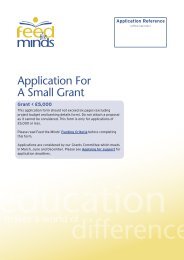Female Genital Mutilation practices in Kenya: - Feed the Minds
Female Genital Mutilation practices in Kenya: - Feed the Minds
Female Genital Mutilation practices in Kenya: - Feed the Minds
Create successful ePaper yourself
Turn your PDF publications into a flip-book with our unique Google optimized e-Paper software.
26.<br />
considered cheaper and easily accessible. But<br />
<strong>the</strong>re were reports that well-off families and those<br />
who can save for it prefer to use a nurse because<br />
cutt<strong>in</strong>g by a health staff is considered safer:<br />
Even <strong>the</strong> poor families will save some<br />
money, if <strong>the</strong>y can, so as to be able to have a<br />
doctor (medical staff) perform <strong>the</strong> cut <strong>in</strong>stead<br />
of <strong>the</strong> traditional circumciser” (participant, FGD,<br />
young unmarried men).<br />
F<strong>in</strong>ancial exchange: The family of <strong>the</strong><br />
<strong>in</strong>itiate pays for <strong>the</strong> cost of circumcision.<br />
Accord<strong>in</strong>g to research participants, medical staff<br />
from <strong>the</strong> hospitals charge between KShs 500-<br />
2000, depend<strong>in</strong>g on “market rates”. Traditional<br />
circumcisers charge comparatively less<br />
and sometimes are paid with non-monetary items<br />
e.g. chickens.<br />
AwAreness oF <strong>the</strong><br />
eFFects oF FGm<br />
Almost all <strong>the</strong> participants <strong>in</strong> <strong>the</strong> research could<br />
identify <strong>the</strong> medical effects associated with <strong>the</strong><br />
practice of female circumcision. The effects<br />
mentioned <strong>in</strong>cluded risk of <strong>in</strong>fection to <strong>the</strong> wound,<br />
bleed<strong>in</strong>g which may lead to death, problems<br />
dur<strong>in</strong>g delivery or permanent damage to nerves,<br />
reproductive or ur<strong>in</strong>o-genital organs. However,<br />
some <strong>in</strong>terviewees associated <strong>the</strong>se complications<br />
to curses or lack of observation of cultural<br />
requirements. For example if <strong>the</strong> attendants to <strong>the</strong><br />
<strong>in</strong>itiates had engaged <strong>in</strong> sex prior to <strong>the</strong> cutt<strong>in</strong>g,<br />
this is thought to lead to excessive bleed<strong>in</strong>g.<br />
Participants <strong>in</strong> <strong>the</strong> study who supported <strong>the</strong><br />
practice argued that <strong>the</strong> medical complications are<br />
no longer a problem for <strong>the</strong> community because<br />
<strong>the</strong> nurses use different blades for each girl:<br />
In <strong>the</strong> past people did not contract <strong>the</strong>se<br />
new diseases, <strong>the</strong>re was no problem with catch<strong>in</strong>g<br />
diseases <strong>the</strong> girls were protected from <strong>the</strong>se<br />
through our culture. Now <strong>the</strong> nurses can use a new<br />
blade for each girl to avoid spread<strong>in</strong>g <strong>in</strong>fections”<br />
(participant, FGD, married men FGD).<br />
On <strong>the</strong> social effects, <strong>the</strong> participants reported lack<br />
of love <strong>in</strong> marriage because <strong>the</strong> women respond<br />
poorly dur<strong>in</strong>g sexual relations, lead<strong>in</strong>g to problems<br />
<strong>in</strong> <strong>the</strong> union. In some cases, <strong>the</strong>ir husbands choose<br />
to marry women from o<strong>the</strong>r tribes as second wives<br />
or keep mistresses because <strong>the</strong>y are not sexually<br />
satisfied <strong>in</strong> <strong>the</strong>ir marriages. Ano<strong>the</strong>r negative<br />
social effect mentioned was that circumcised girls<br />
sometimes lose <strong>in</strong>terest <strong>in</strong> school and drop out,<br />
often to get married.<br />
Attitudes towArds eFForts<br />
to erAdicAte FGm AmonG<br />
<strong>the</strong> kisii<br />
The Kisii region has had many programmes and<br />
activities implemented by churches, and local<br />
agencies to discourage <strong>the</strong> practice. Participants<br />
<strong>in</strong> this study identified key agencies that have<br />
been active <strong>in</strong> <strong>the</strong> area <strong>in</strong> <strong>the</strong> recent past, <strong>in</strong>clud<strong>in</strong>g<br />
<strong>the</strong> YWCA, Maendeleo ya Wanawake, ADRA<br />
(<strong>the</strong> Adventist Relief agency), ActionAid, Fulda<br />
Mosocho and RWAYDO. The organizations tra<strong>in</strong> <strong>the</strong><br />
community through workshops, sem<strong>in</strong>ars and also<br />
through public communication, such as videos,<br />
to urge <strong>the</strong> people change <strong>the</strong>ir attitudes and<br />
re-evaluate <strong>the</strong>ir beliefs around FGM. The study<br />
noted that, unlike <strong>in</strong> Kuria, <strong>the</strong> organisations <strong>in</strong> Kisii<br />
work <strong>in</strong> isolation; accord<strong>in</strong>g to <strong>the</strong> National FGM/C<br />
Secretariat Coord<strong>in</strong>ator, attempts to establish a<br />
regional network to encourage shar<strong>in</strong>g, harmonise<br />
<strong>in</strong>terventions, avoid duplications and ensure better<br />
geographic coverage have not been successful.<br />
However, despite <strong>the</strong>se efforts, research<br />
participants felt that it was still difficult to address<br />
FGM <strong>in</strong> <strong>the</strong> community, and to get local people to<br />
consider abandon<strong>in</strong>g it. For <strong>in</strong>stance, it was felt<br />
that teachers found it difficult to discuss female<br />
circumcision with <strong>the</strong>ir students; <strong>the</strong> older ones<br />
were often too embarrassed to talk about <strong>the</strong> topic<br />
publicly due to <strong>the</strong>ir upbr<strong>in</strong>g<strong>in</strong>g, while <strong>the</strong> younger<br />
ones lacked <strong>the</strong> confidence.<br />
When asked about <strong>the</strong>ir views on <strong>the</strong> role of <strong>the</strong><br />
government <strong>in</strong> promot<strong>in</strong>g abandonment of <strong>the</strong><br />
practice, participants reported that <strong>the</strong>y were




